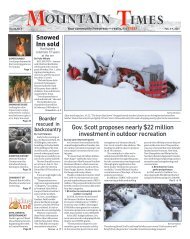Mountain Times - Volume 48, Number 24: June 12-18, 2019
Create successful ePaper yourself
Turn your PDF publications into a flip-book with our unique Google optimized e-Paper software.
The <strong>Mountain</strong> <strong>Times</strong> • <strong>June</strong> <strong>12</strong>-<strong>18</strong>, <strong>2019</strong> STATE NEWS • 7<br />
Ski season:<br />
GMP requests<br />
rate increase<br />
Season recap<br />
continued from page 1<br />
“There was way more coverage than we normally have<br />
for our last day,” said Courtney Fiore, communications<br />
manager for Killington and Pico resorts. “You didn’t have<br />
to take off your skis or boards to get on or off the lift.”<br />
Skiing’s a critical piece of Vermont’s tourism economy.<br />
Tourism generates more than $1 billion in wages and<br />
$391 million in taxes per year, according to the Scott<br />
administration – the largest sector of the economy after<br />
manufacturing.<br />
Vermont resorts report that about 80 percent of their<br />
ticket buyers are visiting from out of state. Southern<br />
Vermont areas such as Stratton and Mount Snow tend to<br />
draw heavily from Boston, New York, and Connecticut;<br />
Jay Peak near the northern border sees a lot of skiers from<br />
Quebec.<br />
The winter started off with a record-breaking snowfall<br />
of nearly 33 inches in November, according to meteorologist<br />
Roger Hill. The next highest snowfall total for November<br />
was back in 1900, with <strong>24</strong> inches. The average snowfall<br />
in November is 6 inches. Temperatures in November were<br />
also 5 degrees cooler than normal.<br />
The early season wintry conditions got people in the<br />
mood for skiing, said Win Smith, who owns Sugarbush.<br />
“It set the tone for the season,” Smith said Monday. “Cold,<br />
early snowmaking temperatures and no major thaw also<br />
made for good conditions throughout the season.”<br />
Nature cooperated further by dumping more than 2<br />
feet during the Martin Luther King Day weekend, and 14<br />
inches in time for Presidents Day week.<br />
“A combination of this snowfall, ever-efficient snowmaking<br />
and no significant periods of warm weather<br />
resulted in very consistent coverage and a higher<br />
percentage of terrain open across the state throughout<br />
the season,” the Vermont Ski Areas Association said in a<br />
statement.<br />
Green <strong>Mountain</strong> Power filed a request<br />
with the Public Utility Commission (PUC)<br />
to increase rates each year for the next three<br />
years by 2.92 percent starting Oct.1, <strong>2019</strong>.<br />
This is part of the company’s new multiyear<br />
regulation plan. The plan, approved<br />
by regulators last month after a yearlong<br />
public process, gives GMP customers predictable,<br />
smoother rates that nearly match<br />
inflation and are comparable in Vermont<br />
and among the lowest in New England.<br />
“We are committed to providing clean,<br />
cost-effective, reliable power to all of our<br />
customers in this time of energy transformation<br />
and innovation needed to address<br />
climate change,” said GMP President and<br />
CEO Mary Powell. “Our team is working<br />
tirelessly to hold rates low for customers,<br />
as we also continue to offer the latest in innovations<br />
such as battery storage that help<br />
to drive down costs and provide benefits to<br />
all customers.” Many of these innovations,<br />
already being put to use for our customers,<br />
are responsible for GMP achieving a multiyear<br />
rate path that helps maintain such low<br />
and stable rates.<br />
The request, subject to PUC review and<br />
approval, follows GMP’s recently approved<br />
multi-year regulation plan, which is a<br />
framework designed to provide stability for<br />
customers around energy costs for the next<br />
three years. Here’s how it works: the PUC essentially<br />
requires GMP to forecast then lock<br />
in most of its own operational and capital<br />
costs and provides for rate variation or<br />
change based upon power supply, storms<br />
and some other individual cost categories<br />
specifically approved by the Commission.<br />
In the second and third year, GMP will go<br />
back before regulators to adjust rates if<br />
needed based on these specific variable<br />
items while maintaining the discipline to<br />
operate within many locked costs. GMP<br />
will also report results over dozens of innovation<br />
and operations metrics to ensure<br />
it maintains high performance for customers.<br />
The plan also supports GMP’s ability<br />
to leverage innovation to lower costs and<br />
carbon emissions for all customers.<br />
“We’ve been thrilling families yearround<br />
for decades with both skiing and<br />
riding and summer adventures at Bromley,<br />
and having steady predictability in our energy<br />
costs will allow us to better plan how to<br />
invest in our company over the next several<br />
years,” said Bill Cairns, general manager of<br />
Bromley <strong>Mountain</strong> Resort, which wins accolades<br />
for its family vacations. “GMP has<br />
been a great partner and understands our<br />
business needs. We appreciate their efforts<br />
to keep costs down for customers because<br />
energy costs are a big factor for a company<br />
like ours.”<br />
GMP, page 39<br />
State to receive $1.75 million<br />
from Dollar General for<br />
deceptive pricing<br />
Attorney General T.J. Donovan announced<br />
today that his office has reached<br />
a $1.75 million settlement with DG Retail,<br />
LLC, also known as Dollar General, for violations<br />
of Vermont’s Consumer Protection<br />
Act. Under the settlement, Dollar General<br />
resolved claims that it rang up products<br />
at a higher price than advertised on the<br />
shelf, even after being told at least 50 times<br />
by state inspectors from the Agency of<br />
Agriculture, Food and Markets to correct<br />
the pricing inaccuracies. The Vermont<br />
Foodbank will receive $100,000 pursuant<br />
to the settlement.<br />
“Deceptive advertising will not be<br />
tolerated,” Attorney General Donovan<br />
said. “Knowing that Dollar General<br />
caters to low-income Vermonters makes<br />
their repeatedly misrepresenting prices<br />
particularly egregious. I’m pleased that<br />
part of this settlement will directly benefit<br />
those Vermonters who struggle with food<br />
insecurity.”<br />
Dollar General operates 36 retail stores<br />
across all 14 counties in Vermont. Dollar<br />
General stores sell a wide variety of groceries<br />
and household products. Pursuant to<br />
Vermont’s weights and measures laws,<br />
inspectors from the Agency of Agriculture<br />
routinely visit Dollar General stores<br />
to ensure that the shelf prices match the<br />
prices charged at the register. At any given<br />
inspection, inspectors randomly check the<br />
shelf prices of 50-100 products and compare<br />
them to the register prices. If the price<br />
charged at the register exceeds the shelf<br />
price, it is known as an “overcharge error.”<br />
Since October 2013, inspectors have found<br />
362 overcharge errors at 22 different Dollar<br />
General stores. Of the 362 overcharge<br />
errors, the price charged at the register<br />
exceeded the shelf price by an amount<br />
ranging from $.02 to $6 per item, with a<br />
median overcharge amount of $.35.<br />
“Consumer protection is part of our<br />
mission at the Agency of Agriculture, Food<br />
and Markets,” said Secretary of Agriculture<br />
Anson Tebbetts. “When someone shops at<br />
a store they should be assured they are getting<br />
what they paid for. The Agency’s scanner<br />
inspection program provides integrity<br />
at the check-out line.”<br />
Under the terms of the settlement, in<br />
addition to the $1.75 million payment,<br />
Dollar General is required to implement a<br />
pricing accuracy policy to ensure that Vermonters<br />
are charged the price reflected on<br />
a product. Dollar General will also conduct<br />
pricing audits to ensure that their products<br />
are priced accurately.<br />
Since 2013, Dollar General has paid at<br />
least $<strong>24</strong>1,700 in penalties to the Agency of<br />
Agriculture, Food and Markets.

















